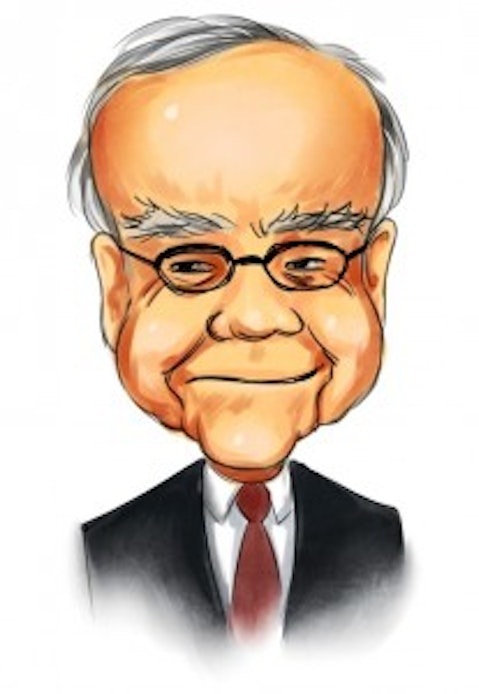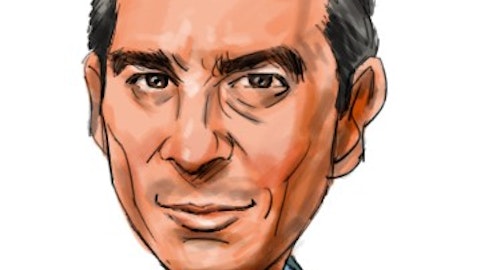
In 2011, Berkshire Hathaway Inc. (NYSE:BRK.A) invested $1.7 billion building up a 3.6% stake in Tesco PLC (PINK:TSCDY), the world’s third-largest retailer, according to Warren Buffett’s annual letter to investors earlier this year. In January 2012, after Tesco’s first profit warning in nearly 20 years, Berkshire Hathaway took advantage of the share price falls to increase its stake to 5.08%. Last week, on 3rd October 2012, Tesco announced its second quarter results for its 2013 accounting year which ends in February 2013. It reported its first profit fall in 18 years which resulted in multiple downgrades from analysts and left the share price 17% below the average price of £3.79 paid by Berkshire in 2011 and even below the £3.16 it paid when it added to its stake in January this year.
Should you pay 1.5%+ for Neil Woodford to run your money? (Stockopedia)
I once was chatting to an broadsheet financial journalist who told me that articles on only three topics make up the majority of their online readership – Buffett, Goldman Sachs and Gold. It is perhaps then little surprise that the piece I published on Friday about Warren Buffett’s edge (or lack of) inspired a great amount of debate, not only on this site but also around the Web. It’s extraordinary that we care so much about Buffett, when the evidence suggests that his best days might be decades behind him. Surely we should spend more time investigating who is or may be the Warren Buffett of today. It’s on this note that we should take a closer look at Neil Woodford…
Beware of Buffett’s bet on newspapers (MarketWatch)
In June, Warren Buffett made some eyebrow-raising news by purchasing 63 newspapers from Media General, Inc. (NYSE:MEG) -2.82% . Instantly came the twin reactions that the old man had finally lost his mind, or that he was once again shrewdly pouncing on an unrecognized opportunity. I’ll go with the latter, with the caveat that there’s a speculative cast to the deal. The question for investors is whether it’s a reason to invest in Buffett’s Berkshire Hathaway BRK.A -0.02% BRK.B -0.13% or to mimic the investment. The answer to the first question is no. The answer to the second question is that you shouldn’t even try.
Post-Spin-Off Kraft: Investors Pursue Dividends Over Growth (SeekingAlpha)
The former Kraft Foods Inc. (KFT) was in the headlines back in August when Warren Buffett revealed a substantial reduction in his position. However, Buffett still has a substantial position with 59 million shares. KFT is also making headlines due to the spin-off of its North American grocery business. On August 4, 2011, Kraft Foods announced the spin-off, which was formally approved this past August. That spin-off was completed this past week with the formation of the Grocery business as Kraft Foods Group Inc. (KRFT) representing the North American grocery business of Kraft Foods and Mondelez International Inc. (MDLZ) which contains the other international food and snack businesses. The following table shows KFT in comparison to several other U.S. based diversified food companies.
Knowing the real value of Warren Buffett (HindustanTimes)
Last week, there was a spate of articles commenting on a paper on Warren Buffett published by three researchers working at a US hedge fund. The paper, ‘Buffett’s Alpha’, analyses what exactly is the reason behind Buffett’s extraordinary returns as an investor, sustained over three decades. Of course, trying to explain Buffett’s returns is an extremely active cottage industry. All sorts of analysts, journalists and others regularly weigh in, including, some time back, Nassim Nicholas Taleb of Black Swan fame. Predictably, Taleb applied a bit of Black Swanism to Buffet too. He said that in a large enough pool of investors there would always be some outliers, “I am not saying Buffett doesn’t have skill — I’m just saying we don’t have enough evidence to say Buffett isn’t doing it by chance.”
You don’t have to be super-rich to give to charity (ModBee)
Bill Gates and Warren Buffett started it. Now a small but growing group of far-less-wealthy Californians are joining in: taking a public pledge to leave money to charity after they’re gone. And it doesn’t require being one of America’s billionaires. The point is not about how much you’re giving, but why. “Everyone can leave a bequest to charity of something … . We want to change the idea that you have to be rich to leave money to charity,” said Elfrena Foord, a certified financial planner and co-founder of the California Plan Your Giving Project.
Put your money where your mouth is (NCTimes)
I found inspiring the recent GOP-sponsored “Buffett Rule Act” to allow billionaires, particularly those like Warren Buffett, who support raising taxes on the 1 percent, to check a box on their tax forms to help pay down the U.S. debt. I was also moved by the usual Republican saber-rattling in an election year, suggesting yet another bloody, useless, trillion-dollar war if their candidate is elected. Having lived on this Earth 46 years and not seen a single war fought by the U.S. that had anything to do with my freedom or a clear and present danger to me or my family, I’ve been encouraged by the Republicans to humbly propose the following, which I call “The Chickenhawk Rule Act.”
The benefits of increased FDI limit will be seen more in the long term: Arun Balakrishnan (Business-Standard)
BerkshireInsurance.com, a non-direct subsidiary of billionaire Warren Buffett’s Berkshire Hathaway, currently sells non-life insurance products to retail consumers in India through its website. In an interview with Somasroy Chakraborty, Arun Balakrishnan, chief executive officer of BerkshireInsurance.com, says the company plans to enter the life insurance space soon. Edited excerpts: …The Cabinet approval of 49 per cent foreign direct investment in insurance is definitely a very positive sign, though we still need to wait and see whether it gets cleared by Parliament. Nonetheless, it indicates the government recognises the capital requirements of the insurance industry and is taking steps towards bridging the capital gaps.





